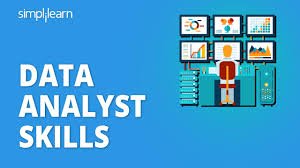Data analytics skills are increasingly in demand as businesses across industries recognize the value of data-driven decision-making. Professionals with strong data analytics skills can extract actionable insights from large datasets, identify trends, patterns, and correlations, and drive business growth and innovation. Whether you’re a data analyst, data scientist, business intelligence professional, or aspiring data professional, mastering key data analytics skills is essential for success in today’s data-driven world. Here’s a detailed guide on essential data analytics skills and how to develop them:
1. Statistical Analysis:
Statistical analysis is foundational to data analytics, enabling professionals to analyze data distributions, calculate measures of central tendency and dispersion, and perform hypothesis testing. Learn key statistical concepts such as probability theory, descriptive statistics, inferential statistics, hypothesis testing, regression analysis, and time series analysis to interpret data accurately and make informed decisions.
2. Programming Languages:
Proficiency in programming languages is essential for data analytics professionals to manipulate data, perform analysis, and build predictive models. Learn popular programming languages such as Python, R, SQL, and Julia, which are widely used in data analytics for data manipulation, data visualization, statistical analysis, and machine learning.
3. Data Visualization:
Data visualization is critical for communicating insights effectively and conveying complex information in a clear and intuitive manner. Master data visualization tools and techniques such as Tableau, Power BI, matplotlib, seaborn, ggplot2, and Plotly to create compelling visualizations, dashboards, charts, and graphs that facilitate data exploration and decision-making.
4. Data Cleaning and Preprocessing:
Data cleaning and preprocessing are essential steps in the data analytics workflow to ensure data quality, consistency, and reliability. Learn techniques for data cleaning, data wrangling, and feature engineering to handle missing values, outliers, duplicates, and inconsistencies in data and prepare it for analysis and modeling.
5. Database Management:
Proficiency in database management is essential for accessing, querying, and manipulating data stored in relational and non-relational databases. Learn SQL (Structured Query Language) to retrieve data from databases, perform data manipulation operations (e.g., filtering, sorting, joining), and create, modify, and manage database objects (e.g., tables, views, indexes).
6. Machine Learning:
Machine learning is a key area of data analytics that enables professionals to build predictive models, classify data, and make data-driven predictions and decisions. Learn machine learning algorithms and techniques such as supervised learning, unsupervised learning, and deep learning, as well as model evaluation, optimization, and deployment.
7. Data Mining:
Data mining involves discovering patterns, relationships, and insights from large datasets using statistical and machine learning techniques. Learn data mining algorithms and methods such as association rule mining, clustering, classification, regression, and anomaly detection to extract valuable knowledge from data and uncover actionable insights.
8. Big Data Technologies:
Proficiency in big data technologies is essential for analyzing and processing large volumes of data efficiently. Learn distributed computing frameworks such as Apache Hadoop, Apache Spark, and Apache Flink, as well as cloud-based platforms like Amazon Web Services (AWS), Google Cloud Platform (GCP), and Microsoft Azure for big data analytics.
9. Critical Thinking and Problem-Solving:
Critical thinking and problem-solving skills are essential for data analytics professionals to approach complex problems, analyze data effectively, and derive meaningful insights. Develop analytical thinking, logical reasoning, and problem-solving skills to formulate hypotheses, evaluate evidence, and draw conclusions based on data analysis.
10. Domain Knowledge:
vbnetDomain knowledge is essential for data analytics professionals to understand the context, challenges, and opportunities within specific industries or domains. Develop domain-specific knowledge in areas such as finance, healthcare, marketing, retail, manufacturing, or cybersecurity to tailor data analytics solutions to business needs and objectives.
11. Communication and Presentation:
cssCommunication and presentation skills are crucial for data analytics professionals to convey insights, findings, and recommendations to stakeholders effectively. Develop strong written and verbal communication skills to articulate complex concepts, data-driven insights, and actionable recommendations in a clear, concise, and compelling manner.
12. Continuous Learning and Adaptability:
vbnetContinuous learning and adaptability are essential for data analytics professionals to stay updated with emerging trends, technologies, and methodologies in the field. Stay curious, explore new tools and techniques, participate in online courses, workshops, and conferences, and collaborate with peers to enhance your data analytics skills and expertise continuously.
Conclusion:
Mastering essential data analytics skills is essential for success in today’s data-driven world, where businesses rely on data to make informed decisions, drive innovation, and gain a competitive edge. By developing proficiency in statistical analysis, programming languages, data visualization, data cleaning and preprocessing, database management, machine learning, data mining, big data technologies, critical thinking, domain knowledge, communication, and continuous learning, you can become a skilled data analytics professional capable of extracting valuable insights and driving business impact through data-driven decision-making. Start by identifying your areas of interest and learning objectives, and leverage a combination of online courses, tutorials, projects, and real-world experience to develop and refine your data analytics skills over time. With dedication, perseverance, and a commitment to lifelong learning, you can build a successful career in data analytics and make a meaningful impact in your chosen field.

